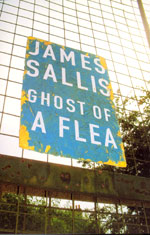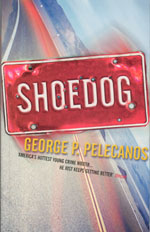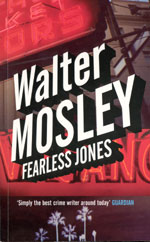Still Turning The Pages
| |
| |

| I'm really not very good on memory. I never remember stuff for very long, or if I do it's always the wrong stuff. I don't remember lines from books. I don't remember the sequences of the history of painting, or art, or anything. I don't really remember who sang what song, when, on what album or why I bought it. I don't remember where I filed that album when I rearranged my collection. I don't remember lines from songs, as a rule, except when they leap out at the oddest of moments and lodge in my head, never to be shifted except for when I can maybe mention them in a letter, or a throwaway line in a lesson or a bit of shitty writing like this. I sometimes wonder to myself what the point then in all of this media consumption might be. I consume all these books, these records, these movies, and for what? I mean, I don't want to be one of those teen-bore-boys (it's nearly always boys) who wander around reciting verbatim lines from movies (only Vincent Gallo can get away with THAT kind of shit), but still. What's the point? I hope somewhere inside maybe the knowledge held in these artefacts is being boiled down, fermented into something useful that might, just might resurface one day as something transfigured and new (to me). That's my hope anyway. Otherwise, it's what? Just filling in the hours until I die? It's some 'high-brow' alternative to shopping. And anyway it IS shopping because I have to buy the damn things in the first place. So is that all out lives come down to in the modern end? Shopping? Jesus. Lew Griffin remembers all sorts of stuff. He's forever bringing up quotations and peppering them through his books. Lots of philosophy, Emerson in particular but I think that might be an American Thing, so... And of course I say Lew Griffin when I really mean James Sallis. It's James Sallis who manages to pull up all sorts of delightful philosophical gems and he just happens to use Lew Griffin to give them voice. Such is the life of the writer. Of course Lew Griffin himself is a writer too as well as a teacher, an investigator and a drunk. Not that Sallis is all of those things, or indeed any of those things except writer, although... I guess somewhere inside we're all of us all of those things at some point in our lives, to a greater or lesser degree, with more or less adherence to some dictionary definition. James Sallis writes like God. But only sometimes. I read his 'spy thriller' Death Will Have Your Eyes, and it's not that hot. But the Lew Griffin novels, now that's another matter. Kevin of course was way ahead of me and most when he mentioned back at the start of the year being obsessed with the Lew Griffin novels. And me being me I've been doing it ass-backwards, reading the fifth in the series first (the excellent Bluebottle) and then the series closing Ghost Of A Flea second. This is typical me. Ghost Of A Flea is real gem of a book, with more twists, turns and half-obscured layers than you can shake a stick at. Whatever the hell that means. It had me in tears, damn it, which might have been partly because of Boxing Day Blues, or might have been to do with the fact that Sallis is so adept at creating characters you care deeply about, all in the space of two hundred twenty or so pages, and of course all the spaces between. Jack Boulter in his excellent piece on Noir suggested that only in the 'crime' genre are their writers who are currently actively exploring interesting ideas and conceptual avenues with any great spirit or style. I think he's about right at that. Of course all the greatest Noir has always at core been about Identity. This is probably why Sartre and Camus were such fans. Sallis understands this implicitly, and the Lew Griffin novels are notably about Identity and spirit as they are about 'crime'. Indeed, in Ghost Of A Flea, and to a lesser extent in Bluebottle, 'crime' barely comes into it, being much more about the nature of exploration or, if you will, investigation; looking for clues as to who and why we are what we are as much as to solve any misdemeanour. Perhaps also the only misdemeanour our very existence on this Earth, but maybe that's getting altogether too maudlin and end-of-the-year weary. Sallis writes as much as anything about the splendour of books, and the splendour of life and people. He writes about the search for meaning in words and in faces, gestures, touches, kisses, words shared, exchanges... all of this thrown up and examined and found both life-affirming and wanting at the same time. Of course all great Noir is essentially existential, and Sallis writes the poetry of the weary existential outsider with a sparkling mix of the coolest prose in the warmest of lonely hearts. Like I said, James Sallis can write like God. |

| There are some lovely touches in Ghost Of A Flea, in there for the gricers among us. Like the reference to the mighty Canongate Books of Edinburgh (home amongst others to the awesomely cool Rebel Inc imprint that has reprinted such essentials as John Fante, Jim Dodge's Stone Junction, and of course Emmett Grogan's mighty Ringolevio) described here as 'a new publishing house in Scotland run by a bunch of kids'. Or where Griffin is 'reading a novel set in Washington by some guy with a Greek name'. He obviously means George P Pelecanos. It's a double delight to see Pelecanos alluded to in Sallis' book because for a while there Pelecanos was another of those writers I'd say could write like God. His more recent books (Shame The Devil and Right As Rain) have been frankly a shade disappointing, but his trilogy of books featuring Nick Stefanos is a major accomplishment, and at least three of his 'Washington Quartet' (The Big Blowdown, King Suckerman and The Sweet Forever; the fourth was Shame The Devil) are essential reading. As is his 1994 novel Shoedog, recently re-published by Serpents Tail. Shoedog reads much like a sketch for things to come, but it's a deftly drawn sketch and one worth investigatng. The setting is, typically, Washington DC, and if the storyline is maybe at times predictable and pedestrian, then at least you have the fledgling evidence for Pelecanos being the greatest living writer of dialogue to keep you entertained. Fantastic stuff, and more evidence that, despite the recent slight dips in performance, Pelecanos really is still a name you should have up there on your pedestal of great crime writers. Hell, great writers full stop. |

| Another writer who could make a case for being on that Pedestal would be Walter Mosley. The jacket notes on his new novel Fearless Jones (Serpents Tail) suggest that Mosley is the 'finest writer of dialogue alive today' but of course as I've just suggested, that's entirely Pelecanos' crown. But Mosley is no slouch either. Anyone who has read his Easy Rawlins series can attest to that, and in fact the Rawlins books were some of the first to convince me that contemporary crime fiction was nearly the only thing worth bothering with, such was the power and majesty of the writing. Of course no-one's perfect though, and after the miserable Sci-Fi attempt that was Blue Light and the deeply disappointing Walkin' The Dog I wondered if Mosley had lost it. Thankfully, on the evidence of Fearless Jones, he hasn't. Mosley here drops into familiar territory once more, revisiting the '50s LA of the Rawlins series (indeed there's a neat moment in which the characters visit one of Rawlins' properties, and Raymond Alexander gets a passing reference too) and pitting his 'heroic' (Black and Jewish) characters against organised crime (white escaped Nazi's) and their hoods (the desperate Black men, with no other alternative given them, or at least no alternative looked for). There's also the obligatory femme fatale, leading them all a merry dance, and as a result it's hard to see Fearless Jones in any light other than that of the great Chandler Noir. Of course Mosley once famously 'borrowed' the beginning of Chandler's Farewell My Lovely to open his Devil In A Blue Dress, and Fearless Jones too seems to fit right in with the notion of Mosley writing the flip side of Marlowe's LA; reporting from the Black side of the city. Mosley of course makes a big deal out of writing from the Black Point Of View, and at times it's hard to know when he's being intentionally self-deprecating to make a point. Like when his narrating character Paris Minton makes reference to the size of his penis (Mosley has characters do this in several of his books), it's unclear as to whether Mosley thinks this is a sad reflection on Black Men who feel the need to rely on notions of sexual 'power' to establish self-worth, or whether he really does think it (size) matters. James Sallis, it seems to me, writes far better about the nature of being Black in a White world (even though, or perhaps because, Sallis is white himself) because he simply doesn't labour the point, writes more about the nature of being locked outside of main-stream society than about the specifics of Being Black. And maybe of course I only say that because I too am white and middle-class and my only knowledge of being locked out of society is not listening to the same records 'most' people listen to. But of course that's just a slight aside, because in Fearless Jones, Walter Mosley has again written a novel that bristles with action and intrigue, that races along with a terrific pace, insisting you keep turning those pages. © Alistair Fitchett 2001 James Sallis - Ghost Of A Flea is published on January 10th 2002 by No Exit |